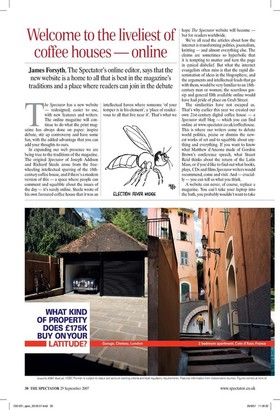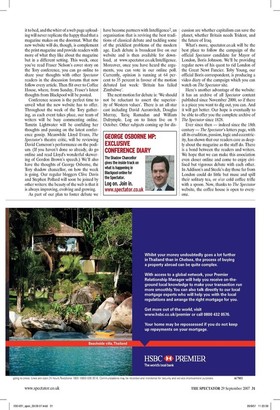Welcome to the liveliest of coffee houses online
James Forsyth, The Spectator's online editor, says that the new website is a home to all that is best in the magazine's traditions and a place where readers can join in the debate The Spectator has a new website — redesigned, easier to use, with new features and writers. The online magazine will continue to do what the print magazine has always done on paper: inspire debate, stir up controversy and have some fun, with the added advantage that you can add your thoughts to ours.
In expanding our web presence we are being true to the traditions of the magazine. The original Spectator of Joseph Addison and Richard Steele arose from the freewheeling intellectual sparring of the 18thcentury coffee house, and if there's a modern version of this — a space where people can comment and squabble about the issues of the day — it's surely online. Steele wrote of his own favoured coffee house that it was an intellectual haven where someone 'of your temper is in his element', a 'place of rendezvous to all that live near it'. That's what we hope The Spectator website will become — but for readers worldwide.
We've all read the articles about how the internet is transforming politics, journalism, knitting — and almost everything else. The claims are sometimes so hyperbolic that it is tempting to mutter and turn the page in cynical disbelief. But what the internet evangelists often miss is that the rapid dissemination of ideas in the blogosphere, and the arguments and intellectual feuds that go with them, would be very familiar to an 18thcentury man or woman; the scurrilous gossip and general filth available online would have had pride of place on Grub Street.
The similarities have not escaped us. That's why earlier this year we created our own 21st-century digital coffee house — a Spectator staff blog — which you can find online at www.spectator.co.uk/coffeehouse. This is where our writers come to debate world politics, praise or dismiss the newest works of art and to squabble about anything and everything. If you want to know what Matthew d'Ancona made of Gordon Brown's conference speech, what Stuart Reid thinks about the return of the Latin Mass, or if you'd like to find out what books, plays, CDs and films Spectator writers would recommend, come and visit. And — crucially — you can tell us what you think.
A website can never, of course, replace a magazine. You can't take your laptop into the bath, you probably wouldn't want to take it to bed, and the whirr of a web page uploading will never replicate the happy thud that a magazine makes on the doormat. What the new website will do, though, is complement the print magazine and provide readers with more of what they like about the magazine but in a different setting. This week, once you've read Fraser Nelson's cover story on the Tory conference, you can go online to share your thoughts with other Spectator readers in the discussion forums that now follow every article. Then flit over to Coffee House, where, from Sunday, Fraser's latest thoughts from Blackpool will be posted.
Conference season is the perfect time to unveil what the new website has to offer. Throughout the week of the Tory gathering, as each event takes place, our team of writers will be busy commenting online. Tamzin Lightwater will be confiding her thoughts and passing on the latest conference gossip. Meanwhile Lloyd Evans, The Spectator's theatre critic, will be reviewing David Cameron's performance on the podium. (If you haven't done so already, do go online and read Lloyd's wonderful skewering of Gordon Brown's speech.) We'll also have the thoughts of George Osborne, the Tory shadow chancellor, on how the week is going. Our regular bloggers Clive Davis and Stephen Pollard will soon be joined by other writers: the beauty of the web is that it is always improving, evolving and growing.
As part of our plan to foster debate we have become partners with Intelligence2, an organisation that is reviving the best traditions of classical debate and tackling some of the prickliest problems of the modern age. Each debate is broadcast live on our website and is then available for download, at www.spectator.co.uk/Intelligence. Moreover, once you have heard the arguments, you can vote in our online poll. Currently, opinion is running at 64 percent to 35 percent in favour of the motion debated last week: 'Britain has failed Zimbabwe'.
The next motion for debate is: 'We should not be reluctant to assert the superiority of Western values'. There is an all-star cast including David Aaronvitch, Douglas Murray, Tariq Ramadan and William Dalrymple. Log on to listen live on 9 October. Other subjects coming up for discussion are whether capitalism can save the planet, whether Britain needs Trident, and the future of Iraq.
What's more, spectator.co.uk will be the best place to follow the campaign of the official Spectator candidate for Mayor of London, Boris Johnson. We'll be providing regular news of his quest to rid London of the Great Newt Fancier. Toby Young, our official Boris correspondent, is producing a video diary of the campaign which you can watch on The Spectator site.
Here's another advantage of the website: it has an archive of all Spectator content published since November 2000, so if there is a piece you want to dig out, you can. And it will get better. Our hope is eventually to be able to offer you the complete archive of The Spectator since 1828.
Ever since then — indeed since the 18th century — The Spectator's letters page, with all its erudition, passion, logic and eccentricity, has shown that our readers care as deeply about the magazine as the staff do. There is a bond between the readers and writers. We hope that we can make this association even closer online and come to enjoy civilised but vigorous debate with each other. In Addison's and Steele's day those far from London could do little but muse and spill their solitary tea, or o'er cold coffee trifle with a spoon. Now, thanks to The Spectator website, the coffee house is open to everyone.
























































 Previous page
Previous page